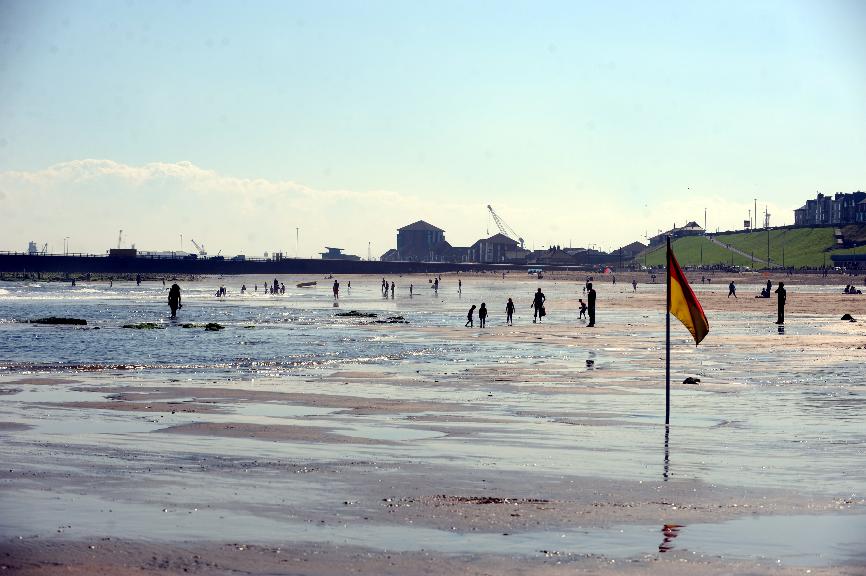How to stay safe in the sun
With temperatures set to reach upwards of 30C in Sunderland early next week, the city's Director of Public health is urging everyone to take extra care to help keep themselves and others safe.

The Met Office have extended their amber warning for extreme heat to cover the whole of the North East, with temperatures set to continue rising over the weekend before peaking on Tuesday.
Gerry Taylor, Sunderland's Director of Public Health, said: "While many of us are enjoying the warmer weather, it's really important that we do everything we can to stay safe in the sun and to look out for those who may be more vulnerable or struggle to stay cool and hydrated in hot weather.
"This includes babies and young children, older people and those with underlying health conditions. So if you know older friends, family or neighbours who fall into these groups it may be helpful to keep an eye on them over the weekend and into Tuesday."
There are simple things we can all do to stay cool in hot weather. These include:
- Staying cool indoors
- Drinking plenty of fluids, avoid excess alcohol and making sure to take water with you if you're travelling
- Staying out of the sun between 11am and 3pm if at all possible
- Looking out for older people and others who may find it more difficult to stay cool and hydrated in hot weather
- Avoiding extreme physical exertion during the hot weather if at all possible
- If you're going out in the hot weather, walk in the shade, apply sunscreen, wear a hat and light, loose cotton clothes
- Don't leave babies, children, older people or vulnerable people or pets alone in stationary cars in hot weather and don't be tempted to cover prams with muslins and covers in an attempt to keep babies cool as they can overheat.
- If you or others feel unwell, get dizzy, feel weak, anxious or have intense thirst, move to a cool place, rehydrate and cool your body down.
The most common illnesses caused by the heat are heat exhaustion, heatstroke, heat rash, sunburn, dizziness and/or fainting. Heat exhaustion is not usually serious if you can cool down within 30 minutes. If it turns into heatstroke, it needs to be treated as an emergency.
Whatever the underlying cause of heat-related symptoms, the treatment is always the same - move the person to somewhere cooler and cool them down. If you suspect someone has heatstroke, call 999.
See Heat exhaustion and heatstroke - NHS (www.nhs.uk) for advice about what to do if you suspect heat exhaustion or heatstroke.
Anyone planning to head to the coast or to rivers, lakes or ponds to try to keep cool is also being urged to take extra care.
The RNLI is urging everyone to remember to 'Float to Live' if they get into trouble in the water by leaning back and using your arms and legs to stay afloat and control your breathing before calling for help or swimming to safety.
Although air temperatures are high, water temperatures are still cold increasing the risk of cold water shock.
Deputy Council Leader Councillor Claire Rowntree, said: "With drowning the third highest accidental cause of death in young people in the UK, it's really important that young people, their parents, grandparents and the wider community are aware of the dangers and think about whether it's safe before they venture into the water.
"We're lucky enough to have some of the best beaches in the country along with some very attractive river banks too and we want everyone who visits them to have a fantastic time. But with the hot weather we're also reminding people of how they can help themselves and their families to stay safe.
"For example swimming in the sea is very different to swimming in a swimming pool and it's very easy to get caught in a rip current that pulls you out to sea or to get cut off, so it's important to choose a lifeguarded beach and to swim between the red and yellow flags.
"Rivers and stretches of open water can also look very inviting in warm weather. But there can be all sorts of hidden dangers just beneath the surface from weeds and hidden obstacles to currents which can pull even the strongest swimmers under.
"Sadly, we have had a number of fatalities in the city in recent years and we know all too well how easy it is to get into difficulty in the water, which is why we continue to work with partners like the RNLI and RLSS and the emergency services to promote water safety messages.
"No-one wants to see their loved ones go through the terrible loss that several families in this city have gone through in recent years so I'd urge everyone to follow the advice of the RNLI in staying safe."
For top safety tips and advice on water safety visit: RNLI - Royal National Lifeboat Institution - Saving Lives at Sea
For additional advice on staying safe in hot weather, visit:
NHS Heatwave: how to cope in hot weather
Beat the heat: staying safe in hot weather - GOV.UK (www.gov.uk)
Keeping your baby safe in the sun - NHS (www.nhs.uk)
Beat the heat: keep cool at home checklist - GOV.UK (www.gov.uk)
Beat the Heat (publishing.service.gov.uk)




